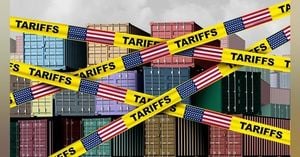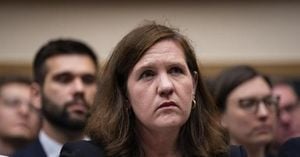In a significant legal setback for President Donald Trump, judges have blocked his executive orders aimed at two prominent U.S. law firms. This decision comes on the heels of Trump's controversial executive order signed on March 28, 2025, which ended collective bargaining rights for a broad swath of federal employees.
The executive order, which the White House claims is part of Trump's larger agenda to reshape the U.S. government workforce, affects over 1 million federal workers. According to a fact sheet released by the White House, the authority for this sweeping action is derived from the Civil Service Reform Act of 1978 (CSRA). This act traditionally allowed for the halting of collective bargaining at agencies with national security missions, such as the CIA, FBI, and National Security Agency. However, Trump's order extends this authority to include employees involved in national defense, border security, foreign relations, energy security, pandemic preparedness, economic stability, public safety, and cybersecurity.
Notably, law enforcement personnel are excluded from this order, with the White House stating, "Police and firefighters will continue to collectively bargain." This exclusion has raised eyebrows among union leaders, who argue that the move is an outright attack on the rights of federal employees.
Irma Westmoreland, a registered nurse at a veterans hospital in Augusta, Georgia, and chair of Veterans Affairs for National Nurses United, condemned the executive order. "This administration's latest executive order is union busting, pure and simple," she stated. "We need to feel free as unionized nurses to speak up about patient safety issues. Veterans deserve nurses who are free to advocate for their care without fear of discipline or losing our jobs." Westmoreland's comments reflect a broader sentiment among union leaders who view Trump's actions as detrimental to employee rights.
The American Federation of Government Employees (AFGE), which represents around 800,000 civil servants, has vowed to challenge the executive order legally. AFGE President Everett Kelley described the order as a "disgraceful and retaliatory attack on the rights of hundreds of thousands of patriotic American civil servants—nearly one-third of whom are veterans—simply because they are members of a union that stands up to his harmful policies." Kelley emphasized the determination of AFGE to fight back, stating, "AFGE isn't going anywhere. Our members have bravely served this nation, often putting themselves in harm's way, and they deserve far better than this blatant attempt at political punishment."
Labor organizations have long argued that the CSRA was established to provide federal workers with collective bargaining rights, allowing them to address workplace issues without disrupting government operations. The White House's fact sheet, however, suggests that certain federal unions have been obstructing Trump's agenda, claiming that hostile unions are impeding agency management.
In the wake of Trump's executive actions, unions have already taken legal action against the administration, targeting various policies that undermine employee rights. For instance, the administration previously issued directives that sought to invalidate collectively bargained telework provisions and restricted the time employees could spend on union-related business. The Transportation Security Administration (TSA) officers, who manage airport security, have already lost their collective bargaining rights under this administration.
As the legal battles unfold, the implications of Trump's executive order extend beyond the immediate workforce. The decision to reshape the federal employment landscape raises questions about the future of labor relations within the government and the rights of workers. Union leaders warn that such measures could have lasting effects on the morale and effectiveness of federal employees, many of whom are dedicated public servants.
In a time when the nation grapples with various challenges, including national security and public health, the administration's stance on labor relations is being closely scrutinized. The potential for a trade war, as hinted by Trump, further complicates the landscape for federal employees and their unions.
As the situation develops, the courts will play a critical role in determining the legality of Trump's executive orders and their impact on federal labor relations. Union leaders are prepared to mount a vigorous defense against what they perceive as an assault on their rights, while the administration continues to assert its authority to reshape the federal workforce.
In conclusion, the recent judicial ruling blocking Trump's executive orders serves as a pivotal moment in the ongoing struggle between the administration and federal employee unions. The outcome of this legal battle will not only affect the rights of over a million federal workers but will also set a precedent for the relationship between government and labor in the years to come.





